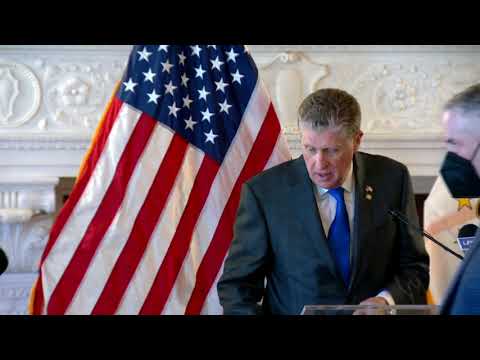Introduction: The Current Status of Mask Mandate in Rhode Island
As the COVID-19 pandemic continues to affect communities worldwide, governments have implemented various measures to control the spread of the virus. In Rhode Island, one such measure was the implementation of a mask mandate. The mask mandate required individuals to wear face coverings in public settings to reduce the transmission of the virus. This article explores the current status of the mask mandate in Rhode Island and its implications for the community.
Understanding the Mask Mandate: What Is It and Why Was It Implemented?
The mask mandate in Rhode Island was implemented as a response to the growing number of COVID-19 cases in the state. It required individuals to wear face coverings in indoor public spaces, including stores, restaurants, and public transportation. The mandate aimed to protect both individuals and the community at large by reducing the spread of respiratory droplets that could contain the virus.
Timeline: A Recap of the Mask Mandate in Rhode Island
The mask mandate in Rhode Island was first introduced on April 18, 2020. Initially, the mandate only applied to employees in customer-facing businesses. However, on May 8, 2020, it was expanded to include all individuals over the age of two in public settings where social distancing was not possible. The mandate remained in effect for several months, with periodic updates and adjustments as COVID-19 cases fluctuated.
COVID-19 Trends: Impact on the Mask Mandate in Rhode Island
Throughout the pandemic, Rhode Island experienced fluctuations in COVID-19 cases. As cases rose, the mask mandate was reinforced with stricter enforcement and public awareness campaigns. Conversely, during periods of lower transmission rates, the mandate was adjusted to allow for certain exemptions. The state closely monitored COVID-19 trends to assess the impact of the mask mandate and make informed decisions regarding its continuation.
The State’s Decision: Has the Mask Mandate Been Lifted?
As of the latest update, the mask mandate in Rhode Island has not been lifted. However, there have been notable changes in recent months. In May 2021, following updated guidance from the Centers for Disease Control and Prevention (CDC), the state announced that fully vaccinated individuals were no longer required to wear masks in most settings. This change reflected the state’s confidence in the effectiveness of vaccines in reducing transmission rates.
Mask Mandate Guidelines: What You Need to Know
While the mask mandate remains in place, there are specific guidelines that individuals in Rhode Island should follow. Fully vaccinated individuals are exempt from wearing masks in most settings, but unvaccinated or partially vaccinated individuals are still required to wear masks in indoor public spaces where social distancing is not feasible. It is important to stay updated on any changes in guidelines issued by the state health department.
Public Opinion: Reactions to the Mask Mandate in Rhode Island
Public opinion regarding the mask mandate in Rhode Island has been diverse. Some individuals have embraced the mandate as a necessary measure to protect public health, while others have viewed it as an infringement on personal freedoms. Several surveys have shown a majority of Rhode Islanders supporting the mask mandate, but there remains a vocal minority who oppose it.
Experts’ View: Perspectives on the Mask Mandate in Rhode Island
Health experts widely support the implementation of mask mandates as a crucial tool in reducing the transmission of COVID-19. They argue that masks, when worn correctly and consistently, significantly reduce the risk of transmission. Experts emphasize that mask mandates are most effective when combined with other preventive measures such as vaccination, hand hygiene, and social distancing.
Evaluating the Efficacy: Did the Mask Mandate Help?
Evaluating the efficacy of the mask mandate in Rhode Island is complex. While it is challenging to isolate the specific impact of mask-wearing, studies have consistently shown that masks can reduce the transmission of respiratory droplets, including those containing the COVID-19 virus. The mandate likely played a role in minimizing the spread of the virus and protecting public health in the state.
The Economic Impact: Effects of the Mask Mandate in Rhode Island
The mask mandate in Rhode Island had both positive and negative effects on the economy. On one hand, it helped to control the spread of the virus, allowing businesses to operate with reduced risk. On the other hand, some businesses faced challenges related to enforcement and customer compliance. The overall economic impact of the mask mandate is difficult to quantify precisely, as it is intertwined with other pandemic-related factors.
What’s Next? Potential Changes to the Mask Mandate in Rhode Island
While the mask mandate remains in effect, potential changes may occur as the situation evolves. Rhode Island will continue to monitor COVID-19 trends, vaccination rates, and guidance from health authorities. Adjustments may be made based on these factors, with the ultimate goal of balancing public health and individual rights.
Conclusion: The Future of the Mask Mandate in Rhode Island
The mask mandate in Rhode Island has been a significant measure in the state’s efforts to combat the spread of COVID-19. While the mandate has not been lifted, recent changes have exempted fully vaccinated individuals from wearing masks in most settings. The future of the mask mandate will depend on ongoing assessments of COVID-19 trends, public health guidance, and the community’s response. As Rhode Island navigates the path to recovery, the mask mandate will likely continue to play a crucial role in safeguarding public health.





